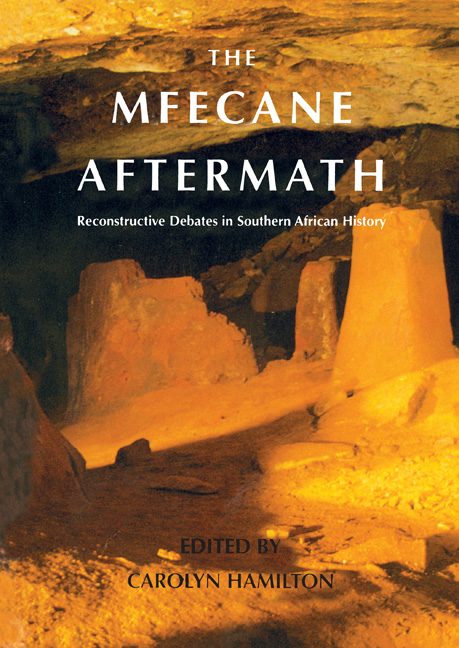Book contents
- Frontmatter
- Contents
- Maps
- Preface
- Acknowledgements
- Notes on Orthography and Names
- Contributors
- Introduction
- Part One Historiography and Methodology
- Part Two The South-Eastern Coastal Region
- Part Three The Interior
- Glossary
- Abbreviations
- Bibliographer's Note
- Bibliography
- Complete List of Papers Presented at the Colloquium
- Index
Preface
Published online by Cambridge University Press: 31 May 2019
- Frontmatter
- Contents
- Maps
- Preface
- Acknowledgements
- Notes on Orthography and Names
- Contributors
- Introduction
- Part One Historiography and Methodology
- Part Two The South-Eastern Coastal Region
- Part Three The Interior
- Glossary
- Abbreviations
- Bibliographer's Note
- Bibliography
- Complete List of Papers Presented at the Colloquium
- Index
Summary
This book comprises a revised selection of the papers delivered at the colloquium The Mfecane Aftermath: Towards a New Paradigm’, held at the University of the Witwatersrand in September 1991. A full list of the papers presented at the colloquium is reproduced at the end of the volume.
The book has been divided into three sections. Each of the sections is preceded by a specially commissioned contextualising essay which offers an overview of the section, together with discussion of the main areas of debate among the contributors to the section. The contextualising essays are designed to serve as introductions to the dense arguments which follow, while their review of debated evidence gives non-specialists the benefit of the evaluation of a scholar well versed in that particular area.
Part One takes stock of the major historiographical and methodological issues. Part Two is concerned largely with the history of the eastern coastal region in the late eighteenth and early nineteenth centuries, and deals with some of the major debates over sources and their interpretation. Part Three examines events in the interior of southern Africa in the same period. Readers will detect greater methodological refinement in the use of sources in the essays in Part Two than in Part Three, as well as more detail and a better established chronology of political events. This unevenness is a consequence of the ‘Zulu aftermath’. Interest in the Zulu kingdom resulted in a long-standing concern with the history of the KwaZulu-Natal region, whereas the myth of the depopulated interior underlay the neglect, until recently, of the precolonial history of the highveld. Scholars like John Wright and Jeff Peires, working on the coastal areas, are able to draw on substantial bodies of recorded oral traditions, about which considerable background material exists, whereas the oral history of the interior has been relatively little attended to. The essays in Part Three prepare the ground for studies of events and close analysis of the pertinent texts of the kind already begun for the coastal regions.
Together, the various contributions to the book provide one of the first detailed overviews of the major developments of the later precolonial period in southern Africa.
Information
- Type
- Chapter
- Information
- Mfecane AftermathReconstructive Debates in Southern African History, pp. ix - xPublisher: Wits University PressPrint publication year: 1995
